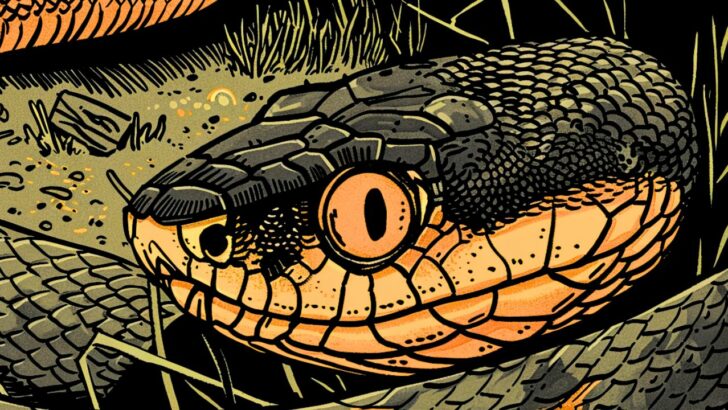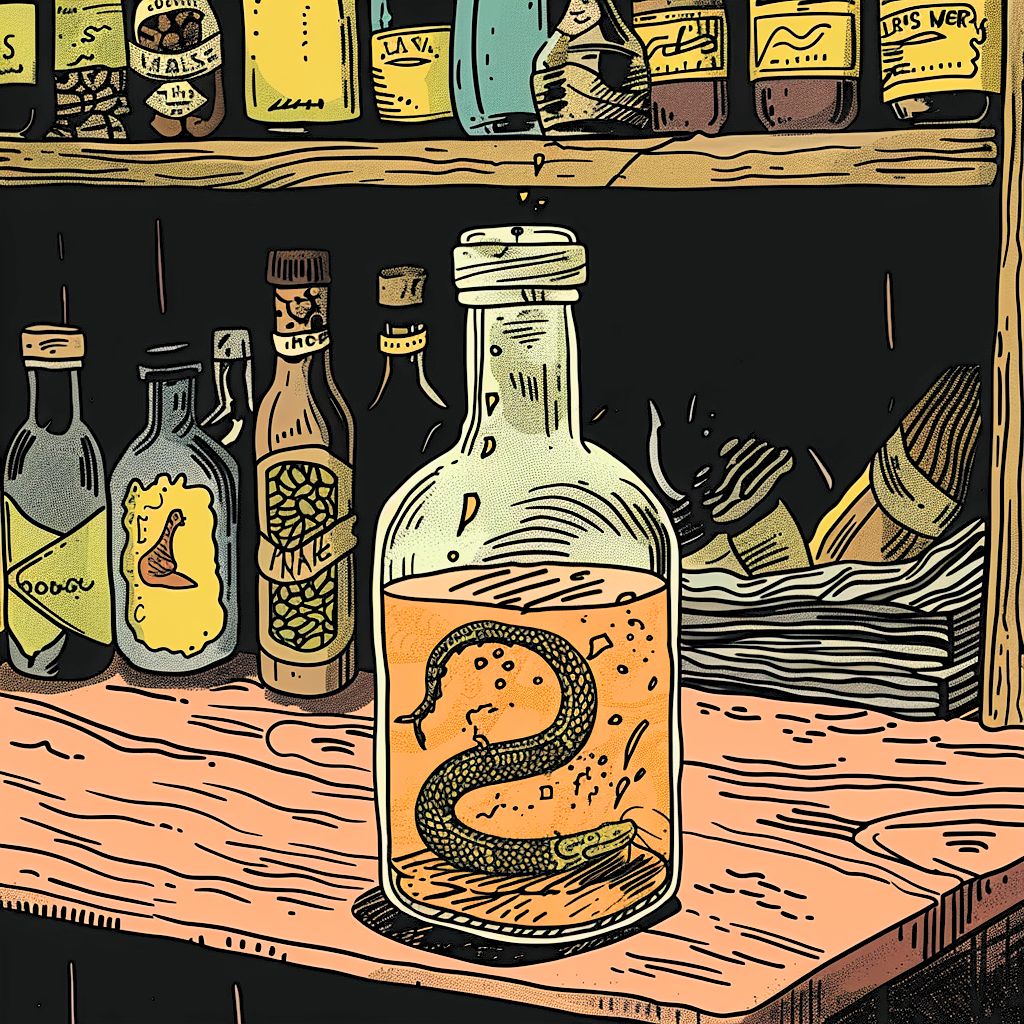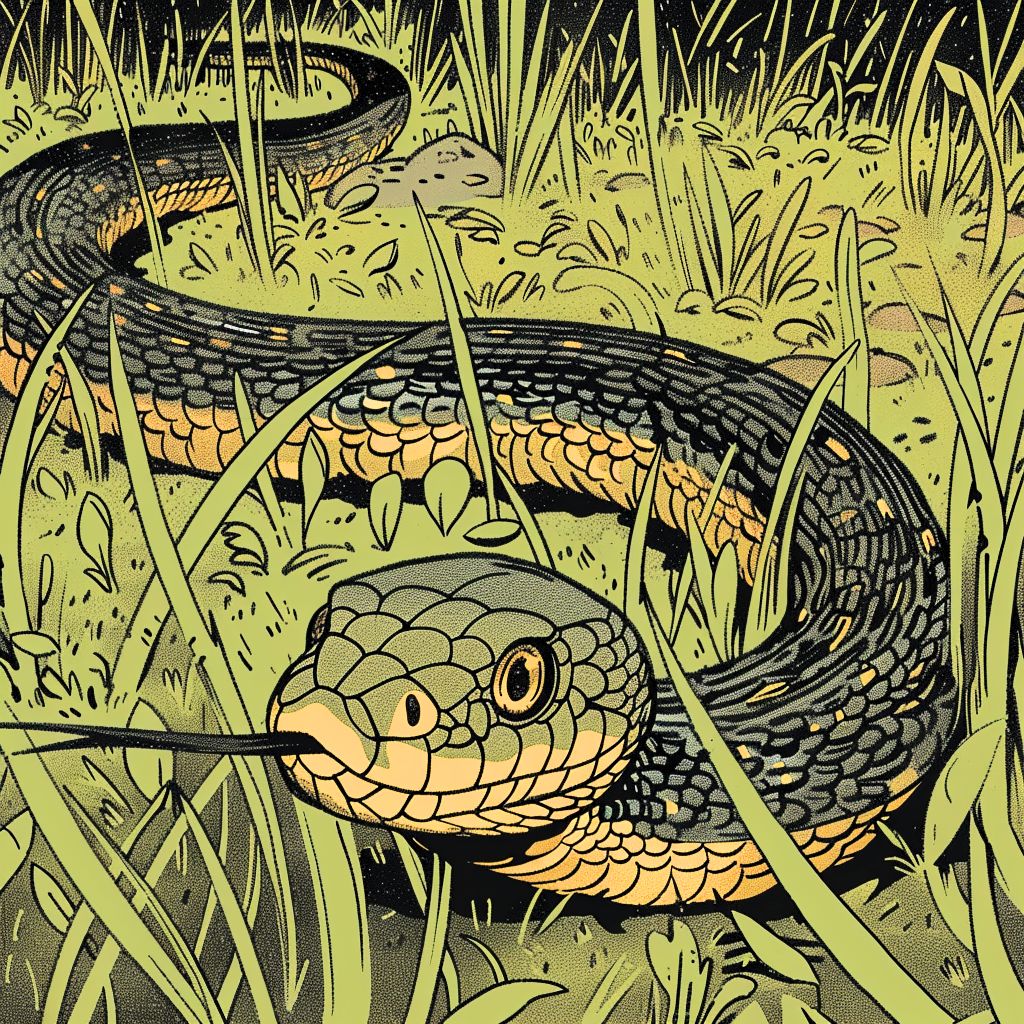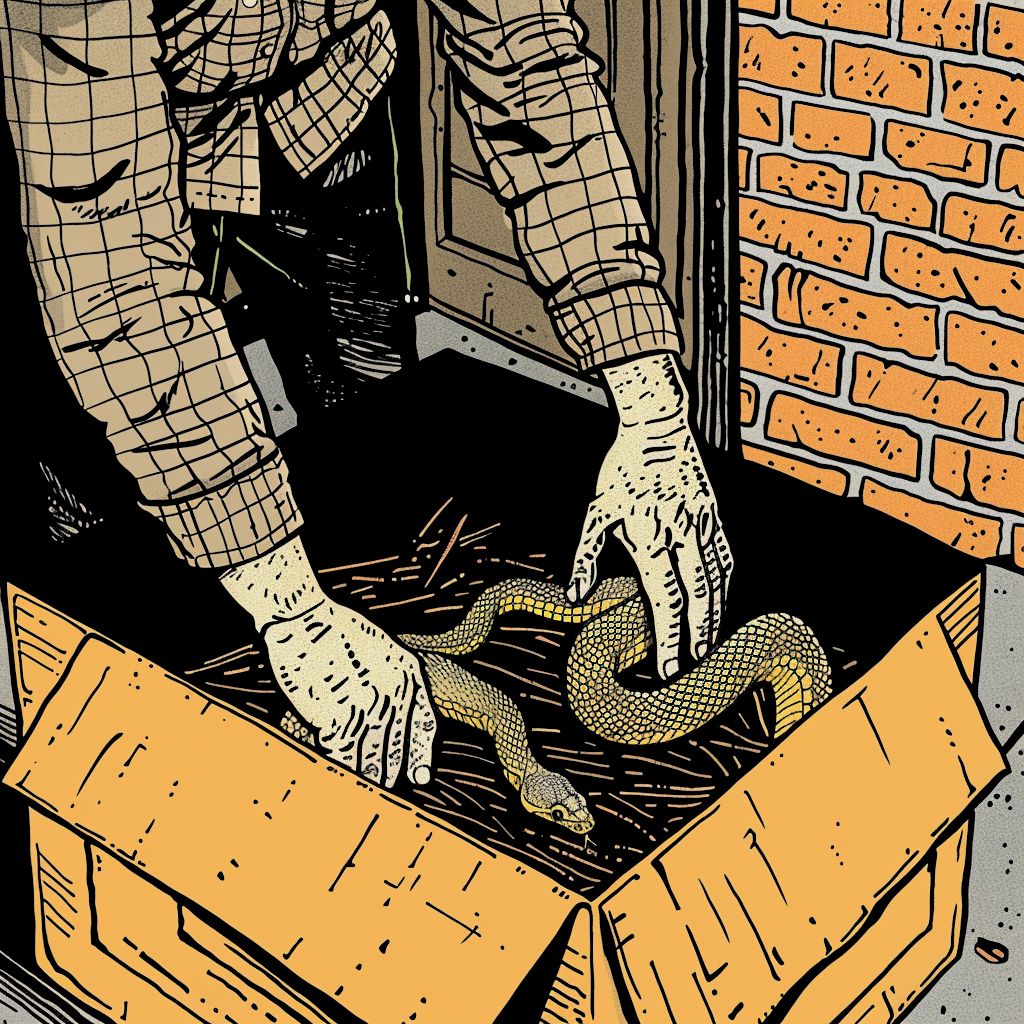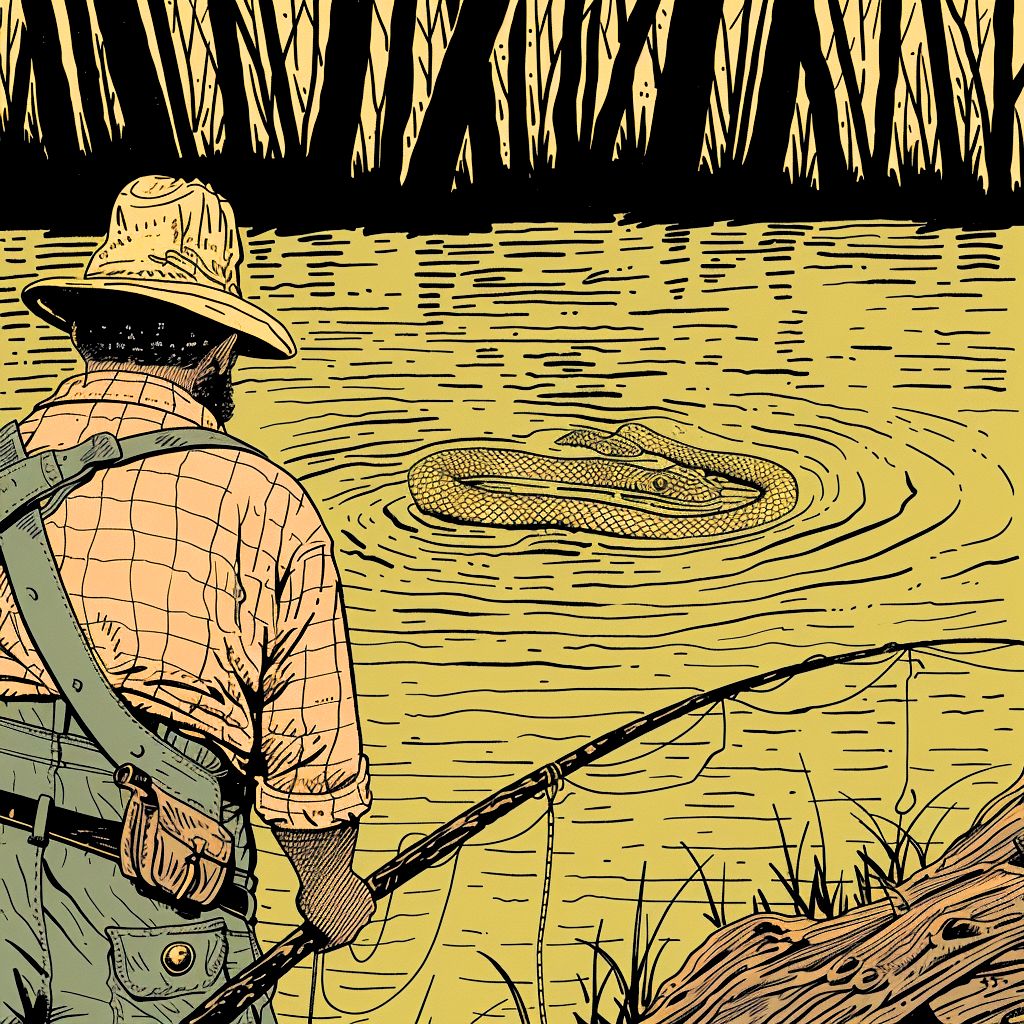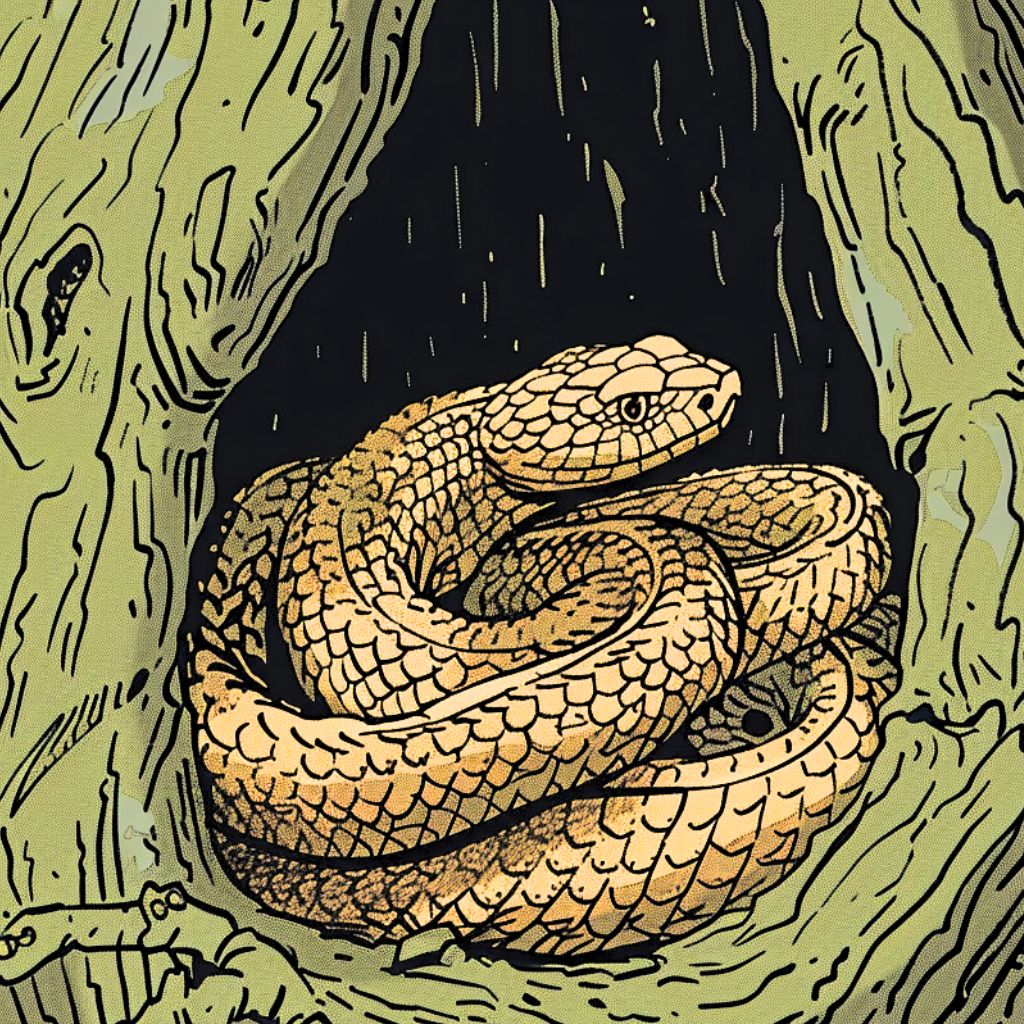Slithering through the underbrush of our conversations, snake idioms weave into the fabric of our language, bringing a blend of wisdom, warning, and wit.
These phrases, rich with imagery and steeped in centuries of folklore and observation, offer a unique lens through which to view our world and its people.
From the treacherous “Snake in the Grass” to the mesmerizing “Snake’s Gaze,” each idiom invites us to navigate life’s complexities with a keen eye and a readiness to adapt.
So, let’s dive into the hidden meanings and stories behind these serpentine expressions, shedding light on their enduring presence in our daily dialogues.
1. Snake Oil
Ah, “Snake Oil,” the granddaddy of all deceptive deals and quack remedies! This idiom slithers into our lexicon from the days of the Wild West, where smooth-talking salesmen would peddle bottles of miraculous cures.
These concoctions, allegedly made from the oil of snakes (spoiler: they weren’t), were touted to cure everything from baldness to rheumatism.
Their only real magic was the ability to make money disappear from your pocket faster than you can say “hissss.”
Today, “snake oil” has come to represent any product or idea sold through misleading claims.
It’s the diet pill that promises you can eat all the cake you want and still lose weight or that app that claims to make you a millionaire by next Tuesday.
In a world filled with flashy advertising and too-good-to-be-true promises, the snake oil salesman has evolved but essentially remained the same: a charmer preying on hope and gullibility.
So, the next time you encounter a deal that seems to be slithering a bit too smoothly, ask yourself: “Is this the modern equivalent of snake oil?”
Chances are, if it sounds like it can cure all your woes without any effort, you might just be looking at a bottle of 21st-century snake oil.
Remember, if it hisses too much like a sales pitch, it’s probably best to let that snake slither on by.
Example 1: When Jenny saw the ad for a hair serum claiming to grow her hair three inches overnight, she scoffed and said to her friend, “That’s got to be snake oil! My hair can’t even grow that fast in a month!”
Example 2: At the tech conference, when the presenter boasted about their new software’s ability to double your business revenue in just a week, Mark leaned over to his colleague and whispered, “Sounds like snake oil to me. Let’s stick to strategies we know are effective.”
2. Snake Eyes
Rolling into the dicey world of gambling, we land on “Snake Eyes.” Picture this: you’re in a smoky, dimly lit room, the sound of chips clinking, and somewhere in the distance, a piano plays.
You throw the dice with a flick of the wrist, and they come to a stop — two ones staring back at you like the cold, calculating eyes of a serpent.
That’s snake eyes, the gambler’s bane, the unluckiest roll in craps that can turn fortunes on a dime (or a pair of dice, as it were).
But “Snake Eyes” isn’t just confined to the green felt tables of Las Vegas.
Oh no, it’s slithered its way into everyday language, symbolizing misfortune or the smallest amount of luck possible in any given situation.
It’s that moment when you reach into a bag of chips and come out with just crumbs or when you’re trying to impress someone with your cooking, and you end up burning the toast.
Snake eyes, my friend, is life’s way of saying, “Better luck next time!”
So, next time you encounter a bit of bad luck, just remember: you’ve rolled snake eyes. It’s not the end of the world, but it’s a reminder that sometimes, the dice just don’t fall in our favor.
Example 1: After losing his third game of pool in a row, Tom threw his hands up and said, “Guess I’m rolling snake eyes tonight. Maybe I should quit while I’m only slightly behind.”
Example 2: Lisa checked the weather app on her phone, hoping for sunshine on her wedding day, only to see a forecast full of thunderstorms. “Looks like we’ve rolled snake eyes with the weather,” she sighed, starting to look for indoor venue options.
3. To have a Snake’s Appetite
Moving on to a particularly ravenous piece of our linguistic menagerie, we have “To have a Snake’s Appetite.”
Imagine, if you will, the awe-inspiring sight of a snake dislocating its jaw to consume a meal several times its head’s size.
Now, translate that boundless hunger into human terms, and you’ve got yourself an appetite that could rival a buffet’s worst nightmare.
This idiom isn’t about your everyday hunger pangs; it’s about an insatiable desire, a craving that goes beyond the norm, be it for power, wealth, or maybe just an extra-large pizza.
“To have a Snake’s Appetite” is the kind of hunger that keeps you striving for more, never quite satisfied with what you have.
It’s the ambition that drives people to achieve great things, albeit with the risk of biting off more than they can chew.
In moderation, a snake’s appetite can be the fuel for progress. But beware—unchecked, it can lead to a bellyache of epic proportions, or worse, a life consumed by the pursuit of never-ending desires.
So, the next time you feel your ambitions stretching your capacity to their limits, consider whether you’re fueled by a snake’s appetite.
And if so, is it guiding you to greatness, or are you just in for a case of indigestion?
Example 1: Ever since he started his collection, Jeremy had a snake’s appetite for vintage guitars. No matter how many he acquired, there was always another rare find he was eager to get his hands on.
Example 2: Maria warned her ambitious protege, “Having a snake’s appetite for success is admirable, but don’t lose sight of what truly matters. Balance is key, or you’ll find yourself endlessly chasing shadows.”
4. A Snake in the Grass
We slowly walk stealthily through the grass of our conversational landscapes and encounter “A Snake in the Grass.”
This idiom conjures the image of a hidden danger or an untrustworthy person lurking in unsuspecting places, much like a camouflaged serpent waiting to strike.
It’s the ultimate portrayal of betrayal or deceit lying in wait, ready to inject its venomous surprise just when you feel most secure in your pastoral stroll through life.
Employing “A Snake in the Grass” in conversation is a cautionary flag, a heads-up to keep your wits about you and your grass trimmed short—metaphorically speaking.
It’s a reminder that not every field is as idyllic as it appears, and sometimes, those who seem harmless or even friendly might hide fangs beneath their smile.
The beauty of this idiom lies in its versatility; it applies to personal relationships, workplace dynamics, and even political arenas. It’s a timeless warning that, while enjoying the meadow, you should always be mindful of what might be hiding just out of sight.
Example 1: After discovering his business partner’s embezzlement, Alex lamented, “I never suspected him of being a snake in the grass. I guess it’s true what they say about keeping your friends close and your enemies closer.”
Example 2: Julia felt a chill run down her spine as she recounted the charming newcomer’s sudden betrayal, “He was such a snake in the grass, weaving his way into our group only to spread rumors and lies. It’s hard to believe we didn’t see it coming.
5. Snake Charmer
Next up, we have the mesmerizing “Snake Charmer,” an idiom that brings to mind the image of a skilled individual who, through charm and persuasion, can control or influence the most unmanageable or dangerous situations (or people), much like the traditional snake charmers of South Asia with their flutes enchant snakes.
In human interaction, being labeled a “snake charmer” can be both a compliment and a caution, suggesting a person possesses an irresistible allure and persuasive power that can bend others to their will.
This idiom often describes politicians, salespeople, or anyone who seems to have a knack for swaying opinions, diffusing tense situations, or captivating an audience with their eloquence.
However, it’s not without its shadow side, hinting at manipulation or deceit hidden beneath their enchanting demeanor.
Whether you admire them for their charismatic abilities or distrust the motives behind their charm, there’s no denying the impact a “Snake Charmer” can have on the world around them.
Example 1: Even though the new manager has only been here a week, he’s already got everyone eating out of his hand. He’s a real snake charmer, that one.
Example 2: “Marie can talk her way out of any ticket; it’s incredible. She’s like a snake charmer with those traffic cops.
6. To Put the Snake Back in the Box
Now, let’s uncoil the meaning behind “To Put the Snake Back in the Box.”
This idiom vividly illustrates the attempt to manage or contain a situation that has already spiraled out of control or to suppress information that has begun to spread.
Picture, if you will, the Herculean effort required to coax a hissing, writhing snake back into a confined space after it’s tasted freedom.
It’s an almost Sisyphean task, fraught with difficulty and the potential for backlash.
“To Put the Snake Back in the Box” is often used when damage control is in full swing, whether a PR crisis, a secret revealed, or an attempt to retract a statement already echoed far and wide.
It could be the corporate executive trying to mitigate the fallout from a leaked email or the politician backpedaling on a controversial opinion. The imagery evokes not just the challenge of the task but also the desperation and often futility behind the effort.
Yet, there’s a certain humor to it as well, acknowledging the near impossibility of the endeavor with a resigned chuckle.
After all, once the snake has slithered out, convincing it to return to confinement is a tall order—one that requires caution, strategy, and, sometimes, accepting that some snakes just won’t be boxed again.
Example 1: “After the spoiler for the season finale leaked online, the show’s producers tried to put the snake back in the box, but the theories and spoilers had already spread like wildfire.”
Example 2: “He realized too late that his offhand comments about the merger were sensitive information.
Trying to put the snake back in the box, he pleaded with his team to keep the discussion internal, but the rumors had already taken on a life of their own.
7. To Follow the Snake
Now, let’s uncoil the meaning behind “To Put the Snake Back in the Box.”
This idiom vividly illustrates the attempt to manage or contain a situation that has already spiraled out of control or to suppress information that has begun to spread.
Picture, if you will, the Herculean effort required to coax a hissing, writhing snake back into a confined space after it’s tasted freedom.
It’s an almost Sisyphean task, fraught with difficulty and the potential for backlash.
“To Put the Snake Back in the Box” is often used in scenarios where damage control is in full swing, whether it’s a PR crisis, a secret revealed, or an attempt to retract a statement that’s already echoed far and wide.
It’s the corporate executive trying to mitigate the fallout from a leaked email, or the politician backpedaling on a controversial opinion.
The imagery evokes not just the challenge of the task, but also the desperation and often futility behind the effort.
Yet, there’s a certain humor to it as well, acknowledging the near impossibility of the endeavor with a resigned chuckle.
After all, once the snake has slithered out, convincing it to return to confinement is a tall order—one that requires caution, strategy, and sometimes, accepting that some snakes just won’t be boxed again.
Example 1: “After the spoiler for the season finale leaked online, the show’s producers tried to put the snake back in the box, but the theories and spoilers had already spread like wildfire.”
Example 2: “He realized too late that his offhand comments about the merger were sensitive information. Trying to put the snake back in the box, he pleaded with his team to keep the discussion internal, but the rumors had already taken on a life of their own.
8. Snake’s Gaze
Venturing into the enigmatic realm of the “Snake’s Gaze,” this idiom captures the mesmerizing, often hypnotic influence that can captivate and hold one’s attention spellbound.
Picture the intense, unblinking stare of a snake, drawing you into a trance-like state where the world fades away, leaving only the connection between the observer and the observed.
In human terms, someone with a “Snake’s Gaze” possesses an allure or charisma so powerful, it feels almost impossible to look away or resist their influence.
This idiom isn’t just about physical attraction; it’s about a compelling force of personality, a depth of character, or a mastery of rhetoric that commands attention, respect, or even obedience.
It could be the charismatic leader whose speeches inspire masses, the teacher whose lessons captivate students, or the artist whose work draws you in, refusing to let go.
Yet, the “Snake’s Gaze” also carries a warning: the same captivating power can be used to deceive, manipulate, or control.
Just as the snake hypnotizes its prey, a person with a “Snake’s Gaze” might not always have benevolent intentions.
Thus, while we may be drawn to the allure of the snake’s gaze, we must also be wary of becoming too ensnared, losing our sense of judgment or autonomy.
Example 1: “As soon as he walked into the room, all eyes were on him, his presence as commanding as a snake’s gaze, leaving everyone hanging on his every word.”
Example 2: “She had a way of looking at you that felt like a snake’s gaze, intense and impossible to ignore, making it clear she expected nothing but the best.
9. To Step on a Snake
Now, let’s slither our way into “To Step on a Snake.” Unlike the more figurative idioms we’ve explored, this one packs a literal punch—or bite, if you will.
Imagine walking through a dense forest or even just a grassy field, not paying much mind to where you’re placing your feet, only to suddenly feel that you’ve stepped on something… alive.
The panic that ensues, for both you and the snake, encapsulates the shock and unforeseen consequences of carelessness or oversight.
Metaphorically speaking, “To Step on a Snake” refers to inadvertently causing a problem or triggering a negative reaction by carelessly blundering into a situation.
It’s about the unforeseen backlash from actions taken without thought or awareness of the surrounding context.
This idiom serves as a cautionary reminder to tread carefully in unknown territory or sensitive situations, lest you provoke a response you’re not prepared to handle.
It’s a prompt to pay attention, to be mindful of where we’re stepping—both literally and figuratively.
After all, some snakes can be avoided with a bit of vigilance and a willingness to understand the environment you’re navigating.
Example 1: Diving into the discussion without fully understanding the team’s dynamics was like stepping on a snake, igniting tensions I wasn’t aware existed.
Example 2: He thought he was making a harmless joke, but it was like stepping on a snake. The room went silent, and he quickly realized he’d touched a sore spot he hadn’t known was there.
10. Fishing for Snakes
Drifting into the murky waters of “Fishing for Snakes,” this idiom paints a picture of deliberately seeking trouble or inviting danger.
Imagine standing at the water’s edge, line in hand, not in pursuit of fish but rather the serpents lurking below the surface. It’s an act that borders on the foolhardy, a deliberate provocation of the dangerous and unpredictable.
In a broader sense, “Fishing for Snakes” is about stirring up problems where there were none, poking the bear, so to speak, or meddling in affairs best left alone.
It speaks to a certain recklessness or desire for conflict, perhaps out of boredom, malice, or a misguided sense of curiosity.
This idiom warns against unnecessary provocation and the unintended consequences that can arise from dabbling in the venomous affairs of others.
Whether it’s needlessly stirring up drama, delving into controversies with no regard for the fallout, or simply picking fights for the sake of it, fishing for snakes rarely ends well.
It’s a reminder that some waters are best left undisturbed, and some snakes are better left to slither in peace.
Example 1: “By spreading those rumors without knowing if they were true, he was just fishing for snakes, and now he’s surprised he got bit.”
Example 2: “She loves to debate, but sometimes it feels like she’s fishing for snakes, challenging opinions just to watch the chaos unfold.
11. A Nest of Vipers
Ah, let’s slither into the den with “A Nest of Vipers.”
This vivid idiom evokes the image of stumbling upon a hidden, tangled mass of serpents, each ready to defend its territory with venomous zeal.
It’s a place you tread lightly, if at all, knowing that one wrong move could have you entangled with more danger than you bargained for.
In the rich landscape of language, “A Nest of Vipers” symbolizes a group or situation fraught with treachery, deceit, or hostility.
It could be the backstabbing politics of the workplace, a family gathering simmering with unresolved tensions, or any environment where trust is scarce and threats lurk behind every smile.
It’s a warning to be wary of where you place your trust and to remain vigilant against the collective malice that can arise from such venomous gatherings.
This idiom serves as a cautionary tale, reminding us that while vipers alone can be daunting, a nest of them represents a compounded danger, where alliances and shared venom make for a formidable challenge.
It’s a reminder to choose battles wisely and recognize when engagement may be more hazardous than retreat.
Example 1: “Entering the boardroom felt like walking into a nest of vipers, each executive more eager than the last to strike down her proposal and assert their dominance.”
Example 2: “The online forum, once a place of lively debate, had turned into a nest of vipers, with users more interested in attacking each other than discussing the issues at hand.
Slithering Off with a Hiss and a Smile: The Final Shedding
As we retreat from our exploration of snake idioms, it’s clear that these expressions do more than just add color to our conversations—they encapsulate human experiences, emotions, and societal observations with succinct eloquence.
Whether warning us of hidden dangers, urging us to tread carefully, or reminding us of the enchanting power of words, snake idioms enrich our language with their depth and dynamism.
So, the next time you encounter one of these slinky phrases, remember the layers of meaning coiled within, ready to strike with insight and intrigue.

Hey fellow Linguaholics! It’s me, Marcel. I am the proud owner of linguaholic.com. Languages have always been my passion and I have studied Linguistics, Computational Linguistics and Sinology at the University of Zurich. It is my utmost pleasure to share with all of you guys what I know about languages and linguistics in general.

